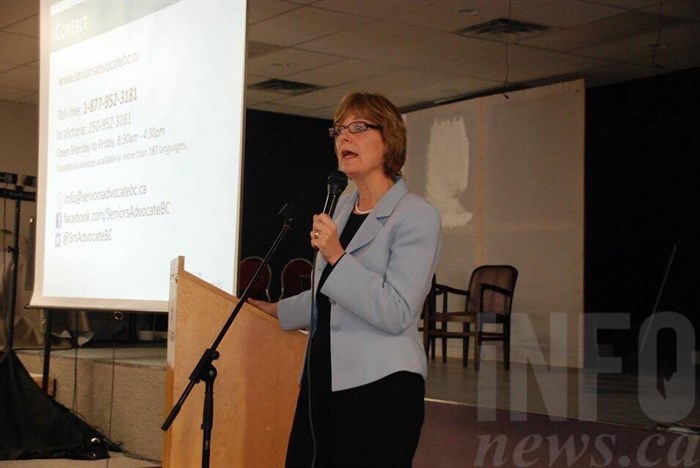
B.C. Seniors Advocate Isobel Mackenzie
(DANA REYNOLDS / iNFOnews.ca)
April 01, 2020 - 8:30 AM
The most shocking and tragic impact of COVID-19 in B.C. has been the deaths of at least 10 residents at the Lynn Valley Care Centre in North Vancouver.
A dozen other similar facilities on the Lower Mainland have at least one confirmed case.
New rules are still being put in place around the province in an effort to minimize the risk to long term care homes and residents who are some of the most vulnerable people in B.C.
But, when this is all over, it may mean government will put a greater focus on the need to reform the fragmented long term care system that is partly to blame for what is happening with COVID-19 in care homes, B.C. Senior’s Advocate Isobel Mackenzie told iNFOnews.ca.
“I think we are seeing, now, one more consequence of the fragmented staffing,” she said. “It’s very difficult, during a pandemic type of outbreak, to put the controls in place that you need in order to control the spread. We are going to be implementing it, but it’s going to take some time to do because of the fragmented system.”
One third of B.C.’s roughly 300 care facilities are run by government, one-third by non-profits and one-third by private, for-profit companies that often hire contractors to manage the facilities.
The private operators, in the past, were able to lay off staff and rehire for less pay. That means workers in those facilities are paid less so they often have to hold down more than one job and work in a number of different facilities, making it easier for COVID-19 to spread to other long term care homes.
One key change the government is making because of COVID-19 is to prevent staff from working in more than one facility. That’s a massive undertaking given there are about 20,000 workers and no central registry that shows where each person works.
The goal is to have them all working full-time in one facility. That might be complete in about a week. They will all be paid the same rate.
Health Minister Adrian Dix, in his daily COVID-19 update yesterday, March 30, said the pay rate will stay the same for six months, after which a review of the system may start.
Mackenzie, for her part, put out a report in early February outlining the problems in the system with private operators often putting profit ahead of care. At least six long term care homes, including the Summerland Seniors Village, have been put under a public administrator in the last year.
But it wasn’t just the staffing issue that caused Lynn Valley to be such a problem. According to CBC, the COVID-19 outbreak caused many staff to stay at home, leaving it critically short-staffed.
Another was the lack of general understanding, at the time (the first death was recorded March 8), about COVID-19.
Mackenzie said outbreaks of contagious illnesses at long term care homes are not unusual. There were 185 of them last year.
“When there is an outbreak of anything in a care home — whether it’s COVID or whether it’s influenza or whether it’s gastrointestinal — we have protocols,” she said. “There’s a difference between ‘we have a protocol’ and whether the protocol is being followed.”
It appears that there was some hesitation to react fast enough at Lynn Valley so things got out of hand very quickly.
“We learned from Lynn Valley,” she said. “You’ve got to remember that was a different time and a different strategy.”
Another change that’s been put in place is to declare an outbreak and take protective measures as soon as there is one case identified where, before, there had to be two.
Just as there are back-up strategies being put in place to treat COVID-19 patients in hospitals, there are also plans being put in place in case there are more outbreaks in long term care homes that may make it difficult to maintain minimum staffing levels.
“I could spend less than a day with you and I could teach you enough for you to go in and be useful,” Mackenzie said. “You don’t have to do the personal care and change the catheter bags and things like that. But you’re going to be useful just taking meals to people. I can teach proper body mechanics in an hour – here’s how you lift and transfer. You can be useful in that way. You can be useful just checking in and helping people and getting them a glass of water. The key is, you’re going into one facility.”
The other clear thing that is going to happen is that all these changes are going to be disruptive to many patients who no longer get to see their families and may lose connections they have with staff.
This is not the time, however, to try to fully reform the long term care system, Mackenzie stressed. Now is the time to put all the processes in place to keep residents and staff safe during the COVID-19 outbreak.
To contact a reporter for this story, email Rob Munro or call 250-808-0143 or email the editor. You can also submit photos, videos or news tips to the newsroom and be entered to win a monthly prize draw.
We welcome your comments and opinions on our stories but play nice. We won't censor or delete comments unless they contain off-topic statements or links, unnecessary vulgarity, false facts, spam or obviously fake profiles. If you have any concerns about what you see in comments, email the editor in the link above.
News from © iNFOnews, 2020